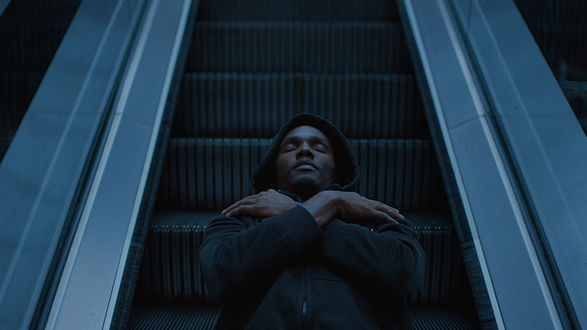The 2020 Film London Jarman Award
14 - 15 October 2020
Michelle Williams Gamaker, Jenn Nkiru,
Hannah Quinlan and Rosie Hastings,
Project Art Works, Larissa Sansour,
Andrea Luka Zimmerman

Jenn Nkiru Still of `BLACK TO TECHNO` 2019 ©JENN NKIRU
Sorry - You missed the Jarman films on the g39 website. The next online showing will take place at Nottingham Contemporary on Thursday 22nd October, with a Q&A by Jenn Nkiru.
This year’s Film London Jarman Award tour will see the best in contemporary artists’ filmmaking taken on a virtual tour to venues across the UK from 24 September – 15 November 2020.
Featuring work from the artists shortlisted for the 2020 Film London Jarman Award, the tour will offer art and film lovers the chance to explore a diverse and exciting range of work, from Larissa Sansour’s 2-channel black and white sci-fi film to Jenn Nkiru’s exploration of the black history of techno music.
Discover the incredible diversity of approaches in artists’ filmmaking in the UK, with a presentation of the work of the shortlist of this year’s Film London Jarman Award, which comes with £10,000 prize money. In this special online screening for 2020, the six artists present innovative, imaginative and immersive films that each address important topics faced by contemporary society.
The artists shortlisted this year are: Michelle Williams Gamaker, Hannah Quinlan and Rosie Hastings, Jenn Nkiru, Project Art Works, Larissa Sansour and Andrea Luka Zimmerman. There will be a Q and A with one of the shortlisted artists also available online as part of the presentation.
Inspired by visionary British filmmaker Derek Jarman, the Award recognises and supports artists working with the moving image. The shortlisted artists illustrate the spirit of inventiveness within moving image, highlighting the breadth of creativity and craftsmanship the medium has to offer, as well as its powerful ability to engage and provoke audiences.
The winner of the Film London Jarman Award will be announced on the 24 November. The award is presented in partnership with the Whitechapel Gallery, with support from Genesis Cinema.
The tour runs from 24 September to 27 November and will exist in online partnerships with seven venues across the UK, with a special online version of the Award ceremony.
@FL_FLAMIN
#JarmanAward
Michelle Williams Gamaker
House of Women (2017) 14’17”
Michelle Williams Gamaker works with moving image, performance and installation. Her practice is often in dialogue with film history, particularly Hollywood and British studio films. By restaging scenes to reveal their politically problematic, imperialist roots; her work is a form of 'fictional activism' to recast characters originally played by white actors with people of colour. She combines scriptwriting, workshopping with actors, revisiting analogue VFX and producing props to create intricately staged films.
Michelle Williams Gamaker, House of Women (2017) 14’17”
House of Women revisits the audition for the character of Kanchi, the silent Indian dancer in Michael Powell and Emeric Pressburger’s 1947 film Black Narcissus. The coveted role went to Jean Simmons (famous for playing Estella in Great Expectations, 1946). To become the “exotic temptress” of Rumer Godden’s novel of the same name, the white English actor participates in a racist make-up technique; wearing dark Panstick make-up and a jewel in her nose.
Shot on 16mm film, the four auditionees come face to face with the inherent violence of the process; discussing the history of photography, colonialism and race, class and gender politics with an anonymous reader, who interrogates their motivation for applying. By auditioning only Indian ex-pat or first-generation British Asian women and non-binary individuals, Williams Gamaker re-casts a Kanchi for the 21st Century who crucially speaks.
Hannah Quinlan and Rosie Hastings
In my Room (2020) 17’44”
Hannah Quinlan and Rosie Hastings are an artist duo working in film, drawing, installation and performance. Their work examines the behaviours, history, politics and artefacts of LQBTQ culture in the western context, exploring how this culture is reflective of broader societal structures. Their collaborative practice uses film as part documentary and research, and part cinematic experience with an expert use of sound, colour, and camerawork.
Hannah Quinlan and Rosie Hastings, In my Room (2020) 17’44”
In My Room is a new moving image art work by artists Hannah Quinlan and Rosie Hastings. The film is shot primarily in Birmingham’s gay village, an area once heavily dominated by male-only-venues now undergoing rapid gentrification in anticipation of HS2, a high speed rail connecting Birmingham to London. Both venues featured in the film: Bar Jester and Core club are now permanently closed.
Narrated by a new soundtrack composed by Owen Pratt the film features a series of performances choreographed by Les Child. In My Room takes a critical look at male-only social and sex spaces, considering the practice of public sex between men as a nexus of power and world building, questioning, who is able to take risks? Who is allowed agency over their own pleasure? How to be visible without being exploited? How to lay claim to public space?
As the closure of gay venues exposes gay male culture to new challenges the film is intended to function both as a provocation and a document of LGBTQ culture at a time of political, social and cultural turmoil.
Project Art Works
Illuminating the Wilderness (2019), 38’
Project Art Works’ collaborations, projects, events and studio actions challenge societal definitions of care, creative intent, value, communication and identity. Their programmes evolve through studio practice and radiate out to the cultural and care sectors. Work is made visible through projects, collaborations, exhibitions, co-commissions, films, publications and digital platforms, increasing neurodiverse representation in programming, and deepening understanding and visibility.
Personalised and holistic studio environments are recreated wherever a project takes place. The studio is a place of level hierarchy where events and happenings unfold revealing the lived experience and qualities of all those involved. Artists and makers work together in purposeful collaboration using total communication that utilises gesture, sound, signing and empathy and as such is an expansive rather reductive form of connection.
Project Art Works, Illuminating the Wilderness (2019), 38’
Project Art Works is a collective of visual artists and makers. They work towards greater representation of neurodiversity in culture and care. Their productions, collaborations, projects and studio actions challenge societal definitions of care, creative intent, value, communication and identity.
Illuminating the Wilderness is a Project Art Works film directed by artists Kate Adams and Tim Corrigan and shot in collaboration with Ben Rivers, Margaret Salmon and Gabrielle Rapisarda. The film follows days spent together with six neurodivergent artists and makers, and their families or support teams investigating a remote Scottish glen and the pleasures and challenges of the landscape and weather systems of the mountains.
Shot from multiple viewpoints and cameras (some body mounted), the film is unscripted and reveals the subtle fluidity of roles and interactions between this unique and itinerant community away from the practical, attitudinal and social barriers that they face in their everyday lives. Moments of humour and tender consideration for each other unfold as they investigate the different places and spaces of the glen. The remoteness, scale and indifference of the landscape provides a rare sense of freedom and belonging for everyone involved.
Jenn Nkiru
BLACK TO TECHNO (2019) 20’
Jenn Nkiru is an artist and filmmaker. Pushed through an Afro-surrealist lens, her practice is grounded in the history of Black music and the aesthetics of experimental film and international art cinema. Her work draws on the Black arts movement and the rich and variegated tradition of cinemas of the Black diaspora and their distinct experimentation with the politics of form. Her work blends elements of history, identity, politics, music, documentary and dance.
Jenn Nkiru, BLACK TO TECHNO (2019) 20’
Described by Nkiru as what “a relic finding of a Detroiter’s public access TV watching patterns which make up the constellation of Techno might be”, BLACK TO TECHNO, through a visually rich and diverse collage of intersecting narratives, conceptual frameworks, archival references and original imagery, asserts Techno not just as a musical gesture but as a philosophical, sonic and anthropological one; a model for the overcoming of alienation, the undoing of oppositions: between the individual and the means of production, body and tool, soul and machine. BLACK TO TECHNO is not a simple origin story of Techno but rather as Nkiru calls, a cosmic archaeology which deeply explores and excavates the layers bound within this unique sound; the particularity of a people, energy, industrialism, geography, politics; black accelerationism and afrofuturist imaginings of a certain time; all coming together, making an othered sound created by groups of othered people. Featuring cameos from the worlds of Techno, Hip-Hop, Funk, Soul, Detroit and Berlin, this is a uniquely artistic impressionistic take on High Tech Soul: Techno — a futuristic sound falling into the legacy of black music not often celebrated as such.
Larissa Sansour
In Vitro (2019) 28’
Larissa Sansour works mainly with film, and also produces installations, photos and sculptures. Central to her work is the dialectics between myth and historical narrative. Born in East Jerusalem, Palestine, her recent work use science fiction to address social and political issues.
Larissa Sansour, In Vitro (2019) 28’
In Vitro is a 2-channel black and white sci-fi film set in the aftermath of an eco-disaster. An abandoned nuclear reactor under the biblical town of Bethlehem has been converted into an enormous orchard. Using heirloom seeds collected in the final days before the apocalypse, a group of scientists are preparing to replant the soil above.
In the hospital wing of the underground compound, the orchard’s ailing founder, 70-year-old Alia, played by Hiam Abbass, is lying in her deathbed, as 30-year-old Alia, played by Maisa Abd Elhadi, comes to visit her. Alia is born underground as part of a comprehensive cloning program and has never seen the town she’s destined to rebuild.
The talk between the two scientists soon evolves into an intimate dialogue about memory, exile and nostalgia. Central to their discussion is the intricate relationship between past, present and future, with the Bethlehem setting providing a narratively, politically and symbolically charged backdrop.
Andrea Luka Zimmerman
Civil Rites (2017) 28’
Andrea Luka Zimmerman is an artist, filmmaker and cultural activist whose engaged practice focuses on marginalised individuals, communities and experience. It employs imaginative hybridity and narrative re-framing, alongside reverie and informed waywardness. Creative approaches include long-term observation, intervention, re-enactment and the use of found / archive materials, grounded in an honouring of lived realities. Alert to sources of radical hope, this work prioritises an enduring and equitable co-existence.
Andrea Luka Zimmerman, Civil Rites (2017) 28’
Civil Rites is a cine-poem, taking as a starting point Martin Luther King’s 1967 speech, given on receipt of his honorary doctorate from the University of Newcastle. It explores how the core themes of poverty, racism and war continue to haunt our lives. The title plays on the sonic relationship between ‘rights’ in a civil and social sense, and the rituals that inform behaviour. The film listens to the voices of more than two dozen interviews conducted with older and recently arrived residents, housed and un-housed, community organisers, passers-by, educators and others as they think through their responses to these themes. The film locates these voices in dialogue with key sites of resistance from across the Tyneside region and across the centuries. It seeks to learn what has changed (or not) in the lives of people in Newcastle today.









